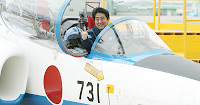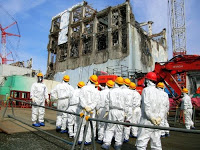 Nile Bowie and James Corbett
Nile Bowie and James Corbett
Activist Post
Nile Bowie discusses the Fukushima disaster and the daunting possibility of economic collapse in an increasingly militaristic Japan with James Corbett, independent journalist and editor of the Corbett Report:
NB: Japanese Prime Minister Shinzo Abe’s ruling coalition has grasped a strong mandate in recent parliamentary elections, and this is viewed as a green light to continue pressing ahead with the much-touted “Abenomics” economic reform program. In Japan, government debt to GDP sits at a staggering 245%, while government expenditure to government revenue amounts to some 2000%. The strategy being employed in Tokyo has essentially been mass Ben Bernanke-style money printing with the aim of inflating away some of the debt and boosting Japanese exports off the back of a weakened yen. Is this a long-term solution, or could mishandling lead to a hyper-inflationary situation, or a currency war brought on by Japan’s neighbors because their exports are being priced out of the market by Abe’s QE.
JC:The risks posed by Abenomics are manifold. While the hyperinflationary risk seems slightly less pressing given the past two decades of deflationary recession here in Japan, the currency war is already underway and shows no signs of abating. The Federal Reserve just has to talk about the possibility of curtailing their own stimulus programs and the markets there begin to plunge. This is an increasingly dangerous situation. The real risk, however, lies in the Japanese bond market. It’s the second largest bond market in the world (after the US’) and is the real backbone of the Japanese economy, itself the third largest economy in the world. If it becomes destabilized as a result of unforeseen consequences of Abenomics, not only is the government’s ability to continue financing its mountainous debt called into question, but so is the stability of much of the Japanese banking system which has large exposures to that bond market.
NB: Abenomics has earned the praise of US pundits and prominent Western economists, and much of the news coverage of Japan’s economic restructuring has been pretty positive in light of the dramatic surges in the Japanese stock market. Are Japan’s improved GDP rates an accurate measure of its real economic growth? Over the past two decades, wages have stagnated; are any measures being taken to raise real wages? Is there a real danger of a mass sell-off in the Japanese bond market in the face of extreme interest rate volatility?
JC: Proponents of Abenomics simply spoke too soon. The modest 1% GDP growth achieved in the first quarter was attributed largely to psychology and expectations of Abenomics’ effects. Private consumption was up 0.9% on the quarter. However, private capital investment, signaling the strength of the economy from the business perspective, actually fell by 0.3%. Meanwhile, excited projections of 3.6% growth in Q2 fell considerably short, clocking in at only 2.6%, again boosted by consumer spending (up 0.8%) and dragged down by lack of capital investment (down 0.1%).
Again, it is the bond market that tells the true tale of whether this monetary expansion will work in the long run. Remarkably, Japanese 10 year bond yields were at their lowest point this year (0.45%) when the BOJ announced their plan to purchase 7 trillion yen of JGB a month and double the monetary base. After the announcement, yields actually rose, flirting with 1% and now trading in a channel around 0.77%. This is the exact opposite of what is supposed to happen in the wake of this type of stimulus announcement, and only goes to show that Abe and his crew do not have a handle on the situation. With debt to GDP already the highest in the developed world and more of Japan’s aging population beginning to retire and draw on their JGB holdings rather than purchasing fresh ones, the Japanese government may be unable to stem the coming carnage.
NB: The Abe government is now aiming to boost private investment, privatize more publicly-owned assets and industries, deregulate energy and financial sectors, and pass laws that will allow corporations to fire workers without review; Japan is also taking part in the Trans-Pacific Partnership negotiations, which will have enormous implications for the way business is conducted in the country. What will be the long-term ramifications of these measures?
JC: Japan’s labor laws have long been completely out of step with the rest of the Western world. Ask any Western economist or businessman about the root of Japan’s economic problems and they will talk about the inability of corporations to fire workers or streamline bureaucracies. The Japanese, of course, by and large don’t see things that way and as a result all previous promises of labor reform have come to nothing. With the TPP, however, we could conceivably see the lowering of the bar across the board, in labor laws and just about every other aspect of society. If the TPP goes through, the changes to Japan’s economy, and even the fabric of its society, will be overwhelming. Of course, this is not an issue that is isolated to Japan. Every signatory to the treaty will see drastic changes to business practices, financial regulations, and other key aspects of their economy.
NB: It’s not just economic policy that is changing under Japan’s new government; Abe’s right-wing administration has taken steps to revive Japanese militarism. Reports issued by the Defence Ministry call for Japan acquiring offensive strike capabilities and building up its military. How is the government’s embrace of militant nationalism affecting Japan’s traditional pacifism? Abe’s approach has worked to fuel tensions with China over the disputed Senkaku/Diaoyu islets in the East China Sea – what is the position of the Obama administration on these developments vis-à-vis the pivot to Asia policy?
JC: The US DoD’s so-called Asia-Pacific Pivot has to be seen as the green light signal for increased militarism across the board in the Asia-Pacific region. With the US increasingly turning its attention (and overwhelming military superiority) to the region, governments across the board feel more free to ratchet up the rhetoric and increase military budgets. The Abe administration, too, is taking full advantage of this, engaging in a dangerous game of one-upsmanship with China over their territorial issues that Japan is increasingly confident will be backed up by American firepower if need be. Attendant with this is a complete reversal of Hatoyama’s DPJ rhetoric about getting the Americans out of Okinawa. As the recent downing of the HH-60 over Okinawa and the US Air Force’s subsequent no fly zone enforcement shows, if anything the American military presence in Japan is going to expand and strengthen under Abe.
 NB: Regarding plans to amend the country’s post-World War II Constitution to allow for expanding the military, Deputy Prime Minister Taro Aso was actually quoted saying, “We should proceed quietly. One day, people realised that the Weimar Constitution had changed to the Nazi Constitution. No one had noticed. Why don’t we learn from that approach?” Some have expressed concern that Abe’s drive toward creating offensive military capabilities aims to revive Japan’s imperialistic policies – is that an accurate assessment? Is Japan really in a position to dramatically bolster its military spending?
NB: Regarding plans to amend the country’s post-World War II Constitution to allow for expanding the military, Deputy Prime Minister Taro Aso was actually quoted saying, “We should proceed quietly. One day, people realised that the Weimar Constitution had changed to the Nazi Constitution. No one had noticed. Why don’t we learn from that approach?” Some have expressed concern that Abe’s drive toward creating offensive military capabilities aims to revive Japan’s imperialistic policies – is that an accurate assessment? Is Japan really in a position to dramatically bolster its military spending?
JC: Japan already is bolstering its military spending, with the Abe administration increasing the defense budget for the first time in 11 years earlier this year. But its important to realize that Japan doesn’t need to expand its defense budget significantly; it already has one of the world’s most advanced and well-trained militaries. That military has simply been operating under the guise of a “Self-Defense Force” but the switchover of Japanese forces to an active military would be more to do with perception than with actual switchover.
The big issue is one of public opposition. A significant majority of the Japanese public are extremely wary of these moves to amend the constitution, but the 2012 parliamentary election that led to Abe’s victory was primarily about domestic issues. Now that Abe has a strong position in the Diet he is almost certainly going to use that momentum to push for constitutional reform. The amendment of Article 9 of the constitution is a very real possibility at this point, and a very worrying one given the implications that would have for Japan’s relations with China and the inevitable bolstering of tensions it would bring.
NB: Reports claim that for the past two years, some 300 tons of extremely radioactive water from the failed Fukushima Daiichi nuclear plant – containing 2.35 billion Becquerels of cesium per liter, or 16 million times above the limit – has been flowing into the Pacific Ocean every day. The Tokyo Electric Power Company (TEPCO) has recently announced that the contaminated groundwater accumulating at the site has risen 60cm above the protective barrier, and is now freely leaking into the Pacific Ocean. What are the long-term health and environmental implications if TEPCO is unable to contain the contaminated water? Has the Japanese media accurately portrayed the scale of the crisis?
JC: The major threat to northern Japan remains the contamination of the groundwater and the fishing areas around Fukushima. Unfortunately, throughout the crisis the government has collaborated with TEPCO to keep the true extent of this problem from the public, and rushed to lower radiation standards and get Fukushima produce and fish back on the market as quickly as possible. The media, with a few notable exceptions, has by and large played along with this agenda, and has dutifully focused attention on things that they have been told to concentrate on (like TEPCO’s “cold shutdown” announcement) and avoided some of the thornier issues (like the contamination of the groundwater).
NB: The previous administration of Yoshihiko Noda responded to anti-nuclear protests in the wake of the Fukushima disaster by looking at ways in which Japan could reduce the country’s dependence on nuclear power – this of course would come at extraordinary costs for the energy sector. How strong is the anti-nuclear movement in Japan today, and what is the Abe government’s position on the phasing out of nuclear power?
JC: Whatever momentum might have existed last year to end nuclear power in Japan has completely faded with the Abe government. Recommendations for Japan to become nuclear free later this century have been abandoned, and the administration is moving to restart nuclear reactors as soon as possible. At this point, there does not seem to be a political force, either grassroots or parliamentary, that is able to effectively prevent the restart from taking place.
James Corbett is the editor of the Corbett Report. He produces video reports for GRTV, the video production arm of the Centre for Research on Globalization, and BoilingFrogsPost.com, the website of noted FBI whistleblower Sibel Edmonds.
Nile Bowie is a Malaysia-based political analyst and a columnist with Russia Today. He also contributes to PressTV, Global Research, and CounterPunch. He can be reached at nilebowie@gmail.com.
linkwithin_text=’Related Articles:’




Be the first to comment on "Tokyo Turbulence: The Looming Japanese Crisis"